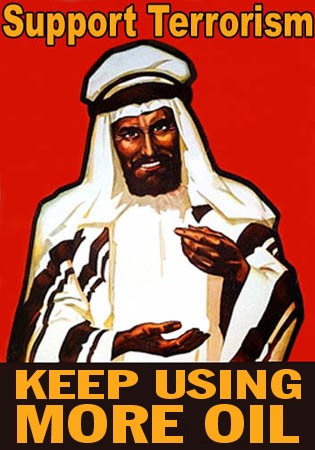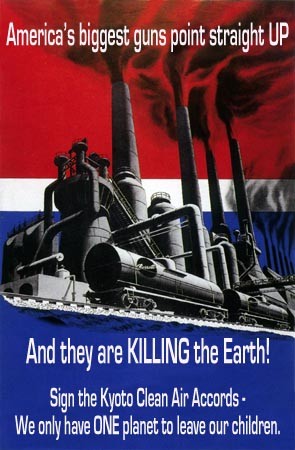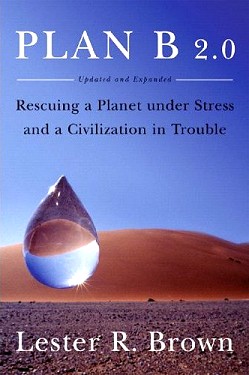 Which to Fear? Which to Fear?
Hope in Plan B - By Greg Franck-Weiby
Illustrations from the Propaganda Remix Project
 Abstract: 'Which to Fear?' is a philosophical discourse designed to invite the reader to (re-) evaluate the most important public issue from a perspective that either hasn't been used or hasn't been applied coherently and comprehensively. Instead of just reacting to the media's pushing your hotbuttons, the idea is to stand back and rationally compare the competing agendas, then choose one and act on it, with discussion of a couple of resources for learning about specific responses to choose. Abstract: 'Which to Fear?' is a philosophical discourse designed to invite the reader to (re-) evaluate the most important public issue from a perspective that either hasn't been used or hasn't been applied coherently and comprehensively. Instead of just reacting to the media's pushing your hotbuttons, the idea is to stand back and rationally compare the competing agendas, then choose one and act on it, with discussion of a couple of resources for learning about specific responses to choose.
America is polarized by fear. That is remarkable because, for much of my life, America was unified by fear (i.e. the 'Cold War'). It is also remarkable that the polarization is not between those who fear and those who don't, but rather by which of two threats each fears.
The two objects of fear both call for a national scale mobilization of resources, a wartime intensity, and a unified commitment to decades of effort with some kind of sacrifice, and with no certainty of outcome. Also, the most extreme partisans of each object of fear believe that the other object of fear is a fabricated illusion, a hoax designed to manipulate in the service of a denied, if not hidden, agenda.
The two objects of fear are related only in indirect ways. They are not necessarily mutually exclusive in terms of each threat being real, but committing our resources to responding to either one can be an obstacle to effective response to the other.
Suspense having served its purpose of opening a possibility of fresh perspective, if you haven't already reached a conclusion regarding what the two objects of fear are, they are the "War on Terror" and consequences of global climate change.
State terrorism has been around as long as states have existed (modern methods of 'shock and awe' have not exceeded the effectiveness of medieval Mongols' tactics of conquest). However, non-state terrorism in the sense we're concerned with now is a product of the Industrial Revolution. Its prevalence and scale, and effectiveness in causing fear, and ineffectiveness in compelling political change have changed little in more than a century.
Cyclical climate change has dictated most of the large scale patterns of all human history, the life cycles of empires and whole civilizations, although historians have only been recently recognizing the fact, and with some reluctance. It is only the scale and global impact of the human contribution to climate change that is new.
America's model for a national response to a national crisis is the second World War. After the mysterious failure of our economic engine and the extreme polarization of radical left and right during the Great Depression, WWII's unity of purpose and solidarity of shared common threat was empowering while the largely voluntary deferment of dissent was a relief from uncertainty. The Cold War was an attempt to make that wartime psychology a permanent condition.
It worked for a generation, but polarization returned with the Vietnam War, while the Cuban missile crisis began to make the permanency of the Cold War intolerable. The War on Drugs has been an unsatisfactory feeble attempt to create a substitute common threat. The end of the Cold War faced us with the reality of a national addiction to war. The then National Security Advisor, Condoleeza Rice, is reported to have said before 9-11, 'what we need is another Pearl Harbor'.
The War on Terror is a curious abstraction. It is not even a war on an idea, as the Cold War was supposed to have been, but rather a war on an emotion - and an emotion that the 'war' is designed to preserve indefinitely. At least the enemy is composed of particular people (even if their identities are hidden), and their hostility is deliberate.
For the climate change crisis, there is no Pearl Harbor, only the gradual discovery and assembly of puzzle pieces of data into a threatening big picture with gradually accumulating scientific consensus. The war metaphor is irrelevant. Who are the enemies? There was no question whose planes were dropping bombs on Navy ships in Hawaii, and most Americans aren't ready to question intelligence services' identification of who flew planes into buildings. Some are tempted to regard Hurricane Katrina as the environmental Pearl Harbor, but nobody's sure who dropped that bomb.
 Where is the enemy? - everywhere - their hostile act? - merely living. It is the billions of peasants in the 'developing world' having too many children while trying to scrape survival from a withering web of life, while the fortunate residents of the developed world are merely enjoying what seems to us a mostly modest version of the 'good life', consuming ten times the resources as each of those too plentiful peasants. The only possible 'enemies' are those who seek to distract us from recognizing this reality. Where is the enemy? - everywhere - their hostile act? - merely living. It is the billions of peasants in the 'developing world' having too many children while trying to scrape survival from a withering web of life, while the fortunate residents of the developed world are merely enjoying what seems to us a mostly modest version of the 'good life', consuming ten times the resources as each of those too plentiful peasants. The only possible 'enemies' are those who seek to distract us from recognizing this reality.
What do we fear if we lose the War on Terror? What would constitute 'winning' the War on Terror - transforming the entire world to regimes compliant to the interests of a globalized elite (which includes us developed world consumers as well as the corporations, more powerful than most nations, that exist to supply our desires), suppressing by force all resistence - by both states and non-state actors - to the economic advantage maintained by a military so powerful it distorts our economy and negates the ideals it supposedly defends?
What would constitute losing the War on Terror? Could non-state actors blow up enough buildings to compel us to transform America into an Islamic republic? Or could they only blackmail us into withdrawing our troops from some of the 140 other countries where they're presently deployed? Would it be defined by our losing control over middle eastern oil supplies needed, not so much by us but rather, by our primary economic rival, China?
What is there to fear from the consequences of failure to avert excessive climate change? The greatest empire that ever existed before our own was that of ancient Rome. In the approach to the low temperature point of the regular thousand year climate cycle occurring over the past 10,000 years, the Roman Empire fell because rapid population decline, due to famine and malnutrition-enhanced pandemic disease, caused economic collapse. That would be the fate of our own empire in another few hundred years of the normal climate cycle.
However, we have already caused the factors that determine climate cycles to change to a greater degree than at any time in the past 10,000 years that civilization has existed. The danger isn't just stronger storms and flooding coastal cities. The concern is that this probably isn't a problem that won't become a crisis for another hundred years, when our greatgrandchildren will have to cope with it using new technologies not yet imagined. The danger is that we're now gambling for everything we've got and everything we'll ever have.
Just as the threat of a terrorist attack dramatic enough to change our perception of the world is, on most days, only a possibility that doesn't necessarily intrude on our consciousness every day, the climate crisis is, for most of us, only a vague worry niggling in the back of the mind. However, this summer, for many people who've seen the film version of Al Gore's "An Inconvenient Truth" lecture and book, the experience has been as alarming as a diffuse kind of threat can be, compared to Pearl Harbor or 9-11.
Consequently, we are reaching a point of polarization where the two fears are roughly balanced between fear of definite dramatic acts of violence, ultimately of globally inconsequential effect, and fear of uncertain, gradual, largely invisible change to the degree that this planet can support human life.
The War on Terror requires of us sacrificing half of our national resources to a military equal to the combined military forces of the rest of humanity. It requires of us the psychological discipline of maintaining our collective narrative that we are inexplicably the victims, with no responsibility for the blowback of our nation's military global bullying and economic manipulation. It requires acquiescence to an ever increasingly totalitarian and permanent concentration of power in the national executive, wherein dissent is not so much suppressed as simply irrelevant to the exercise of that power. Success in this war is that we do not have to change anything in our lives, at least as defined as being consumers.
 Averting climate disaster will require each of us changing many details of our lives, large and small (although, to the extent that effects of climate change prove to be as severe as we fear, far greater changes will be forced upon us if we do nothing). Accepting the reality and implications of climate change enough to fear it requires rejecting the economic interest and political ideology driven complacence - indeed, practically the whole world view - of the presently dominant national political leadership. Averting climate disaster will require each of us changing many details of our lives, large and small (although, to the extent that effects of climate change prove to be as severe as we fear, far greater changes will be forced upon us if we do nothing). Accepting the reality and implications of climate change enough to fear it requires rejecting the economic interest and political ideology driven complacence - indeed, practically the whole world view - of the presently dominant national political leadership.
Believing that 'global terrorism' is in truth what our current regime needs it to be in order to rationalize power grabs domestically and internationally requires faith in secret knowledge claimed by intelligence services that have misrepresented the truth for ideological purposes in the past. It requires faith in 'mainstream' news media owned by a few corporations that support the current regime in exchange for economic advantages, in media that are dependent for their existence on promoting the way of life our unsustainable economy depends upon. It requires accepting the rationales of an administration that has mis-represented practically every one of its policies and actions, rationales that commonly cannot withstand critical examination.
Believing that climate change is enough of a threat to require us, at the very least, to do things we'd prefer not to have to do depends on trusting in the judgement of scientists whose reasoning we understand only in general outline, based on mainframes full of data that most non-scientists would never have the time to examine, even if they had the expertise to evaluate it independently.
How do you know which model of reality to believe, which threats are real enough to fear? Scientists, whose successes are reflected in the technologies that have given us the power to transform the world, have generally earned a better reputation than the politicians who find reasons for war. However, scientists, in their definitive commitment to the level of certainty of knowledge that isn't available for the future, can only offer us frustratingly vague approximations of what might happen.
Meanwhile, we are still dependent on the indirect testimony of others stating that all of the relevant credible peer-reviewed scientific studies agree that human accelerated climate change is a serious concern, and that the few climate change skeptic scientists all have their credibility negated by their studies being financed by oil companies. Is Al Gore a credible witness, or does he have some hidden agenda?
I am persuaded that climate change is a danger infinitely greater than the worst any 'terrorists' can do. My belief does not depend on some slam dunk technical case of climatological science, but rather on its consistency with a big picture of a whole suite of interrelated problems threatening the viability of our civilization. Even if climate change does not turn out the way presumably a majority of scientists fear that it will, the kinds of actions we need to take to avert the dangers are the same kinds of actions required to cope with the other problems.
These problems include soil depletion and desertification, deforestation and depletion of ground water supplies, lagging science based increases in agricultural production and collapsing marine ecosystems due to over-fishing, global population continuing to grow explosively, with increased demand for resource consumption growing faster than the population growth. Each of these problems contributes to the other problems, and regardless of how much and why the climate changes, they contribute to climate change, while climate change aggravates each of the problems.
 These problems - and potential solutions to them - are all outlined in a book titled "Plan B: Rescuing a Planet under Stress and a Civilization in Trouble," by Lester Brown, of the Earth Policy Institute. (The Silver Falls Public Library in Silverton has a copy of this book, and a copy of Plan B 2.0, the updated and expanded 2005 edition, has recently been donated to the Library.) Before bristling at a challenge to the credibility of patriotic anti-terrorism, before poohpoohing climate change as an America-hating Liberal hoax, and before despairing that climate change is already too advanced to mitigate, read this book. These problems - and potential solutions to them - are all outlined in a book titled "Plan B: Rescuing a Planet under Stress and a Civilization in Trouble," by Lester Brown, of the Earth Policy Institute. (The Silver Falls Public Library in Silverton has a copy of this book, and a copy of Plan B 2.0, the updated and expanded 2005 edition, has recently been donated to the Library.) Before bristling at a challenge to the credibility of patriotic anti-terrorism, before poohpoohing climate change as an America-hating Liberal hoax, and before despairing that climate change is already too advanced to mitigate, read this book.
Comprehensive actions are necessary to respond to this comprehensive array of problems. As much as every citizen was called upon to contribute to the war effort in some way during WWII, each American can contribute to solutions by the decisions we make, from our choice of what kind of car to buy to how we use and conserve energy in our homes, and what kinds of food we eat. While no action can be successful without this participation, such individual contributions can neither succeed without national action, both domestically by such means as subsidy shifting and tax shifting (without necessarily decreasing subsidies or increasing taxes), and on a global scale to restore biological systems and fulfill the human needs that drive people to damage those systems.
Must we choose between the two fears? After all, terrorists have crashed planes and detonated bombs. Physicians for Social Responsibility advocates a "Sensible Multilateral American Response to Terrorism" ("SMART Security") that is mainly a shift in strategies and emphasis.
Meanwhile, in Plan B, Brown offers an estimated budget for achieving basic social goals of reducing poverty and improving health in the developing world (e.g. universal primary education, adult literacy, universal basic health care, and reproductive health and family planning, &c.) and restoring biological systems (e.g. reforesting the earth, protecting topsoil on cropland, restoring rangelands, stabilizing water tables, restoring fisheries, and protecting biological diversity). It amounts to $161 billion per year. If the United States alone among the developed countries of the world were financing all of it, that amount is the equivalent of the money wasted in the illegal imperialist occupation of Iraq, plus $60 billion spent on obsolete and irrelevant weapon systems in the regular Pentagon budget, leaving us with still the most powerful military on the planet.
What do you fear? What do you think?
|